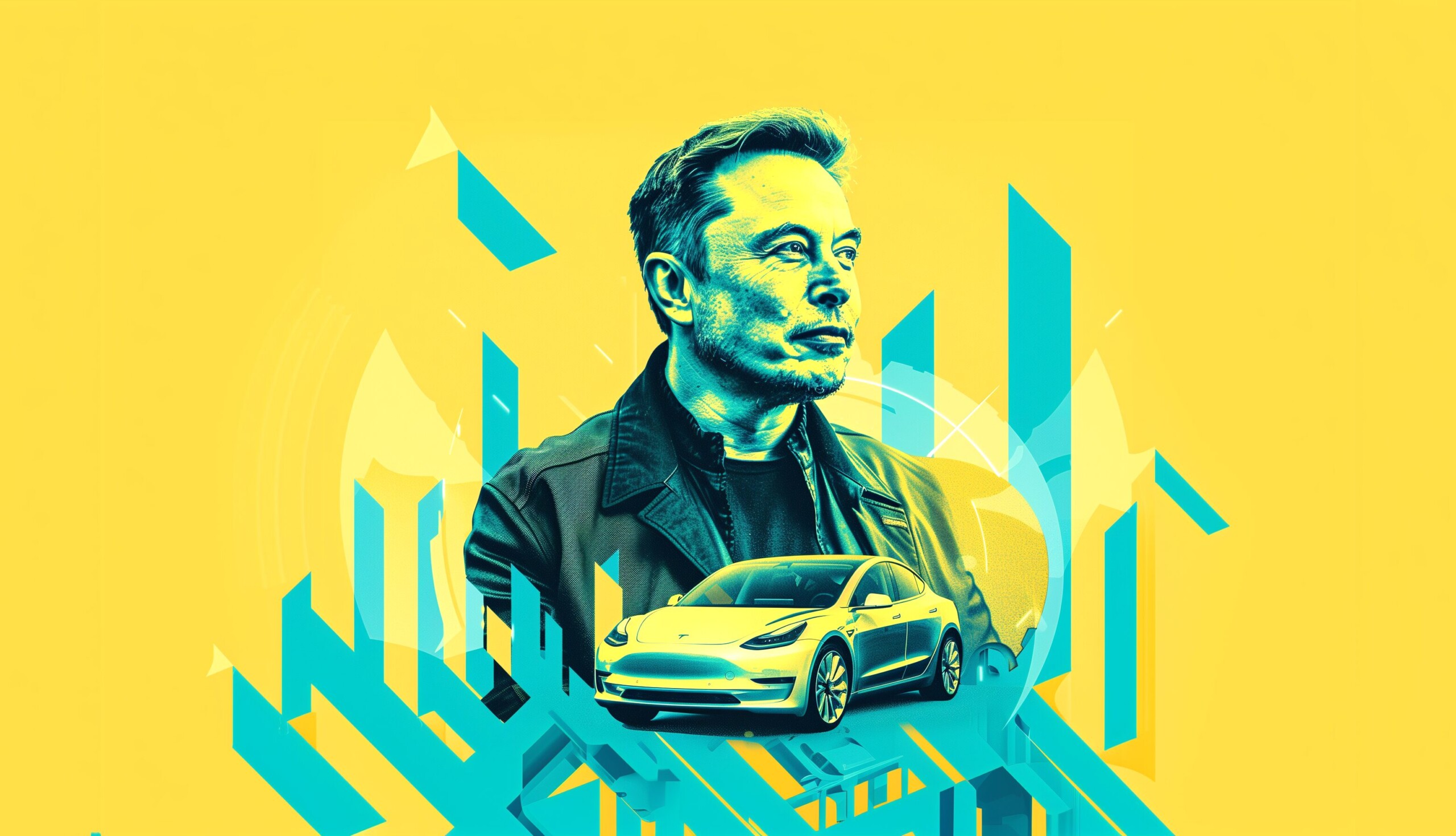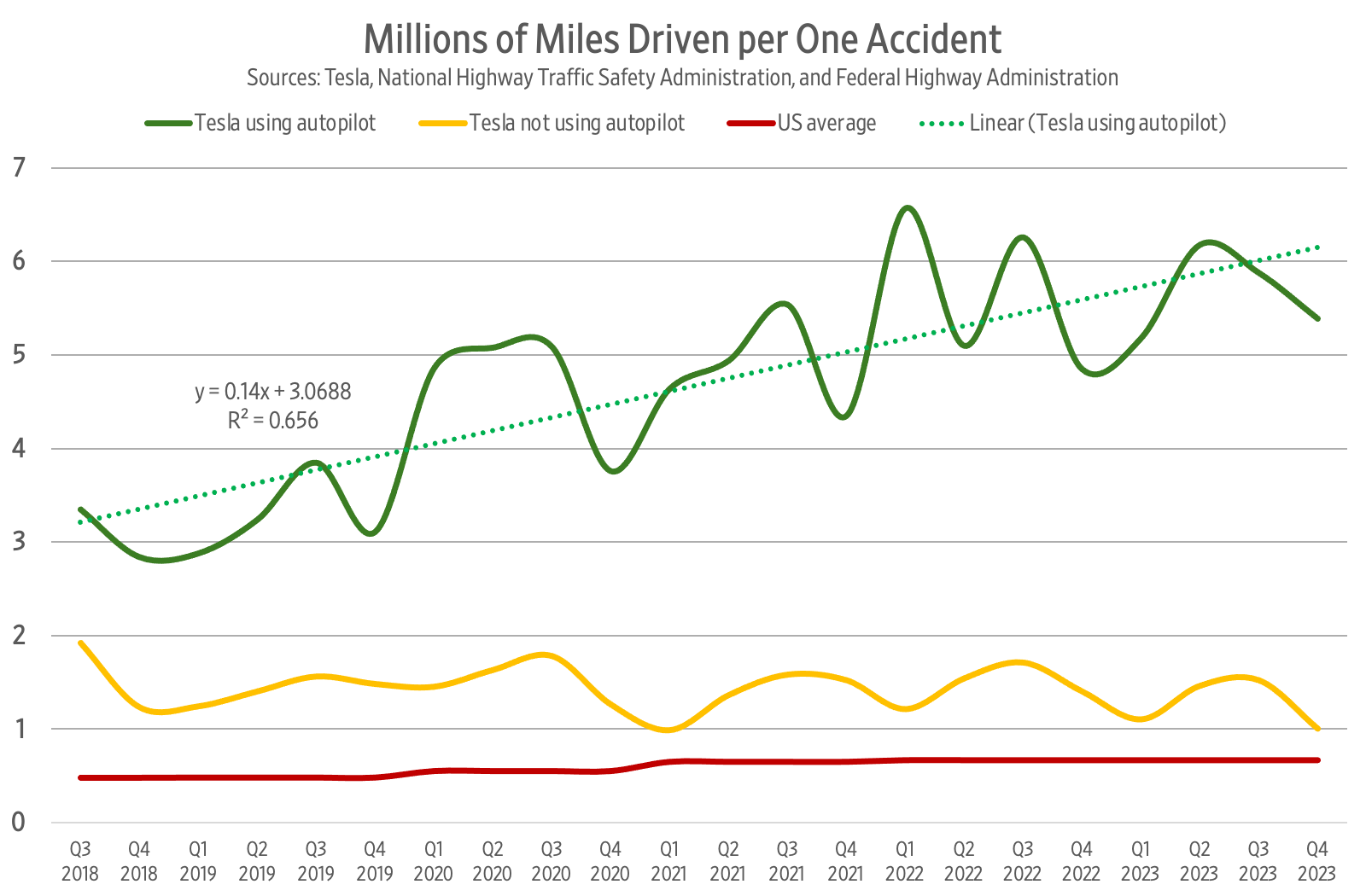Video | Infrastructure & Transportation
Blog Post | Accidents, Injuries & Poisonings
Tesla’s “Full Self Driving” Safety Numbers Are Astonishing
Teslas are 2.5 to 7.8 times safer than the average US vehicle.

Summary: Tesla‘s “Full Self Driving” feature is boasting safety numbers far surpassing the average US vehicle. By learning exponentially, Tesla leverages real-time data collection and analysis to fuel continuous innovation. Tesla is best thought of not just as a car manufacturer, but as a knowledge company at the forefront of shaping the future of transportation.
Elon Musk is pushing the envelope hard. His companies include SpaceX, StarLink, Tesla, X, the Boring Company, and Neuralink. Tesla has been advancing on two fronts: electric-powered vehicles and self-driving vehicles. Tesla’s autopilot Full Self Driving (FSD) feature may be the most valuable contribution to providing more life to enjoy. In terms of miles driven per accident, Teslas without FSD tend to be around 2.5 times safer than the average US vehicle. Adding FSD increases that difference to 7.8 times safer. While driving is getting safer in general, Tesla’s autopilot vehicles are getting safer faster. The safety rate has doubled in the last five and a half years, indicating a compound annual growth rate of around 13.4 percent a year. One reason has to be the real-time data collection and analysis that Tesla vehicles can perform.

Tesla is on an exponential learning curve. It has data on more than nine billion miles driven with autopilot engaged. Every Tesla vehicle is connected, which allows them to immediately analyze and understand the different ways that accidents happen. Software can be updated over the air to incorporate new safety features and enhancements.
Tesla understands that wealth is knowledge, and that growth is learning. That is why Tesla is really a knowledge company with cars as its data source. In April Tesla began offering a free 30-day FSD trial to all compatible cars, a fleet estimated at 1.8 million vehicles. Before the free offer it took Tesla three years to collect a billion miles of data. Now they get a billion miles every two to three months. Data has increased by a factor of 14 (2.5 months versus 36 months). Tesla can also now convert this data into valuable knowledge much faster with artificial intelligence.
The future is between entrepreneurs who continuously seek to discover, create, share, and value knowledge, and bureaucrats who protect the status quo by limiting this wealth creation activity. Elon Musk clearly has an entrepreneurial vision and has invested billions to build this future. We describe the process of transforming scarcities into abundances in our new book, Superabundance, which can be ordered from Amazon or your independent local book store. You can read more at superabundance.com.
This article was published at Gale Winds on 5/15/2024.
“The UK says they have achieved a new frontier in aviation: the first flight with a quantum-powered navigation system that cannot be jammed by foreign actors.
A group of quantum technology and aerospace companies completed the groundbreaking trials at Boscombe Down, a military aircraft testing site last Thursday.
These flights use an atomic clock and an ‘ultra-cold-atom-based quantum system’ that detects changes in motion.
The aircraft is equipped with a quantum inertial navigation system (Q-INS) that doesn’t rely on constant satellite signals to update its position unlike current GPS systems.
That means the system will be more resistant to the effects of GPS jamming, according to the UK’s Department for Science, Innovation and Technology.”
From Euronews.
“Next-gen aviation startup MightyFly says it’s the first company developing a large, autonomous electric vehicle takeoff and landing (eVTOL) cargo drone that’s been approved by the Federal Aviation Administration for a flight corridor…
The corridor, connecting California’s New Jerusalem and Byron Airports (about 20 miles apart as the crow flies), will allow MightyFly to conduct a variety of flight tests with its latest drone, the 2024 Cento…
The latest Cento variant is a hybrid drone about the size of a small single-seater aircraft, and can carry 100 lbs. of cargo up to 600 miles. It’s designed for fully autonomous operation, down to loading and unloading packages. It can even move packages around inside itself to adjust weight and balance as necessary.”
From Axios.
“The batteries in the current generation of Formula E cars deliver up to 350kW of power, and can propel a driver to a maximum top speed of 320km/h (199mph), approaching the top speed of traditional F1 cars. And while the racing series may not have the pedigree – or budget – of F1, it does provide a unique and important testing ground for new battery technology that could benefit the entire EV industry.”
From BBC.
